British intel helped Bangladesh detect liquid cocaine smuggling

The recovery of huge quantity of liquid cocaine in Chittatong Port is a big success against international drug smuggling which has been possible due to the sharing of information between the intelligence agencies of Bangladesh and the UK.
The seizure of 185 kilograms of liquid cocaine is the second largest in recent times after the recovery of 310 kilograms of liquid cocaine by the Canadian customs three months back. The cocaine came in a container from Bolivia.
In Bangladesh, expensive drugs like cocaine and that too in a liquid form is completely a new case for both the police and the customs intelligence. Few have heard of liquid cocaine but never thought it could come through the sea route.
They had no idea about the shipment of the drug, going undercover as sunflower oil. The cocaine would have even been safely carried to its ultimate destination, probably in a European country, had it not been for the tips provided by the British intelligence.
It was the Special Branch (SB) of police who received a tip from the UK agency that a container of sunflower oil was to be shipped to Bangladesh from the South American region containing cocaine in liquid form.
Officials of the agency also informed that the cocaine was not sent for Bangladesh. They said the international drug cartel would only use Bangladesh port as a transit point enroute to another country. To detect liquid cocaine, they hinted that the colour and smell of the cocaine mixed sunflower oil will be different from others.
Those were the pieces of information the SB got from its counterpart in UK in the first week of May. Sensing gravity of the matter, head of SB Javed Patwary himself got into the matter and went to Chittagong to search for the cocaine. But it was not easy.
With the help of port authority and customs, SB officials first went through the records to know whether any company imported sunflower oil from the South American region in the last 3 months. But they found nothing. They also tried to locate the container but that was a futile attempt.
When all seemed grim, the SB boss got another tip from the UK agency about the importer company, Khan Jahan Ali Ltd. Even though the owner of the company outright denied importing sunflower oil, all the godowns of the Chittagong-based company were thoroughly searched but no sunflower oil was found.
Then one-day the owner disclosed that one of his employees, named Sohel, told him about sunflower oil from Bolivia. He informed the SB and customs officials that Sohel's relative who lives in UK sent the consignment and asked Sohel to release it. But the owner did not agree to it as he did not import it.
Then the search for container began again and it was found in the container depot on June 8 with 107 barrels of sunflower oil inside. The consignment, sent by a Bolivian company from Montevideo port in Uruguay, was unloaded on May 8. It came to Bangladesh via Singapore.
The container was opened but they failed to detect cocaine. Narcotics department's test also failed to detect it and then samples were sent to BCSIR and Drug Testing Laboratory in Dhaka for further testing which tested positive for cocaine in one of the barrels on Saturday.
Bangladesh has no equipment or expertise to separate cocaine from oil and thus sought help of United Nations Office of the Drugs and Crimes (UNODC) in this regard.
It is clear to all that the sunflower oil consignment was brought to Bangladesh by an international drug cartel with a target to ship the liquid cocaine to a third country. Police and customs officials say, smuggling cocaine wasn't possible without the help of some locals. The bid to release the consignment by a Bangladeshi national in UK and some locals has already proved it.
Now the question is who are they and how long have they been involved with the drug cartel syndicate. They should be tracked down and arrested to dismantle the network in Bangladesh. The arrest of the employee of Khan Jahan Ali Ltd, Sohel, can provide a lead to that end.



 For all latest news, follow The Daily Star's Google News channel.
For all latest news, follow The Daily Star's Google News channel.
Comments